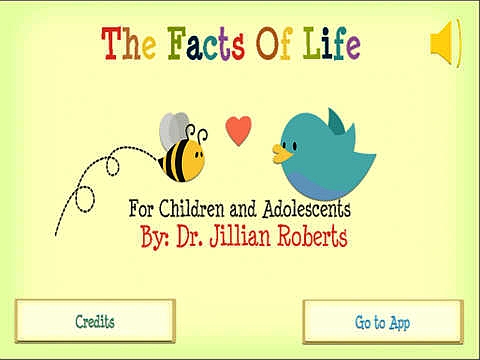Mom? Where do babies come from?
I was caught off guard one day when my then 4 year old asked me that question. Actually, he asked daddy first and then I guess he wanted to see if our answers were the same. Hubby said, “from a door out of mommy’s belly.” And left it at that. Which is partially true, but not exactly but as he got older, and started hearing things in the school yard, we had more explaining to do.
At that time we didn’t have “smartphones” – yes, we had cell phones, remember them? So, we relied on picking up books at the library or book store to help us navigate through how to explain stuff to him.
Flash-forward to today and WHOA! We have everything at our fingertips! There are APPS for EVERYTHING these days! This generation of young kids these days (I sound like my mother, don’t I?), are growing up with smartphones and other mobile devices. So, it makes sense that an APP was created to help us through some early questions on making babies. This caught my attention, THE FACTS OF LIFE APP (available on iTunes for iPad and iPhone) created by Dr. Jillian Roberts, a registered psychologist who works with children in Victoria, BC.
It’s a delightful APP that helps parents introduce the concept of “where babies come from”. In a simplistic form of a storybook, parents can use this to support their discussions on baby-making to their children. The APP is focused on the 6 to 10 year olds with clean visuals and the pace is controlled by the user. Each page also has two options “tell me more” or “enough” allowing users to decide whether or not they want more explanation. Parents may choose to stop at a certain page and no doubt will carry their own conversations at home. It ends with a quiz as well (I admit that I did this test myself — and I passed! Whew!)
I recently had a chance to speak with Dr. Jillian Roberts about this new APP.
Kids are naturally curious about their bodies and “where do babies come from?” is one of the first questions that stumps parents. Should we, as parents, be explaining with actually names of body parts not cutesy names? and why?
Yes, children are curious about their bodies and it can be awkward for parents to explain the facts of life. I think it is a very important conversation, because the more knowledgeable children are–the safer they are. When children know what is appropriate and inappropriate, and the correct terms for parts of their bodies, they are better able to discuss inappropriate experiences with their parents. They are more empowered to say “no” and maintain appropriate boundaries. Also, using correct terms for parts of the body help to de-stigmatize body parts. No part of a child’s body is “dirty” or impure; or should be discussed in hushed terms.
Why did you create an APP for this subject?
As a child psychologist, over the last five years, I have noticed a real shift in how children access information. Children love mobile devices. They like to access information through their mobile devices. They read their books on their mobile devices. I thought, “Wow, I can use mobile devices as a way to reach and connect with kids!” And then, I thought about what conversations–what important conversations–could mobile devices be used for. That was the genesis for the project–let us use mobile devices to help kids.
On this APP aimed at younger kids, you’ve lightly touched on how babies are made without getting into too much detail. Do you recommend parents delve a little deeper if their children persist? How much is too much at this age?
The APP is designed to lay the foundation for the of topic of sexual education, and it is most appropriate for young children. I would suggest ages 6-8 (or perhaps younger, depending on the child and the questions being asked). The app was created to answer the question, “Where do babies come from?” For this age group, children want basic, concrete information. They do not require a long biological discussion. They are not wanting in-depth information about sex. They simply want to know where babies come from. Over the last 15 years of clinical practice, I have kept track of how best to answer those early questions, and the answers that made the most sense to children. This application is a culmination of that experience. And, yes, as children get older they will require more in-depth information. That is the reason why three additional apps are in the works: 1) The Facts of Life: Girls & Puberty, 2) The Facts of Life: Boys & Puberty, and 3) The Facts of Life: Adolescent Version.
How do you recommend parents approach this subject if they are not in the Mother/Father scenario?
The APP is similar to a picture book, but with an important exception: it is designed so that the information flow is controlled by children. This is an important feature, because empowering children to say “more” or “this is enough” makes the experience of talking about the facts of life less awkward for parents and children. The less awkward these conversations are, the more often children will go to their parents for more in-depth conversations. Also, the app is designed to “flow” carefully, so as not to overwhelm children with too much information too quickly–again to make the experience less awkward. Unlike a book, you cannot simply flip forward into tricky territory, so to speak.
The APP seems more like a picture book with a quiz at the end. The price of the download is $1.99 – how did you determine what to charge? It also appears that you will be adding more in the future. Will that be already included with this app? And what can parents expect?
The parents who participated in the pilot studies thought the price was very, very reasonable–much less costly than purchasing a similar book. And, there are no other apps quite like this one. The APP has no in-APP purchases, there are no in-APP advertising. The APP does what it promises to do. The next APPs in the series will be similar, and similarly priced. I am charging something for the APP, so that I can continue making them. APP development is not an inexpensive process!
What are some of the funniest questions you’ve heard from kids on sex? OR what are some of the funniest things you’ve heard from kids — on how their parents explained sex?
I am always delighted with children’s questions. I hear a lot of “REALLY???” and “How is that possible?” And, of course, a fair amount of “Yuck!” and “Gross!” I have found that going about the conversation in small, baby steps makes the topic less “yucky”. I also worked carefully with the graphic artist to ensure that the illustrations are beautiful and appealing for children. Parents and adults often tell me about how they first learned about the facts of life–and these discussions can be very amusing (and sometimes a little sad). I think the funniest story I have is how my own daughter hid the book that I gave her in the rafters of our old house. It is still there, waiting for some child in the future to discover it!
I am going to release a Chinese language version and an android version of the APP in the near future. I will be promoting the APP in China in November. I hope the wholesome nature of the APP will be appealing to families with diverse cultural backgrounds.
The FACTS OF LIFE APP is currently available on iTunes for iPad and iPhone. Link here for more information: THE FACTS OF LIFE
 Dr. Jillian Roberts is a Registered Psychologist (#1398) in Canada with years of experience working with children and adolescents. She is also a tenured Associate Professor of Educational Psychology at the University of Victoria, in BC Canada. Early in her career, Dr. Roberts was a primary and special education teacher. She has co-written three academic books, authored numerous academic articles, and lectured around the world on topics relating to child development. Most importantly, Dr. Roberts is the mother of three beautiful children. Two of her children were born biologically and one of her children was adopted.
Dr. Jillian Roberts is a Registered Psychologist (#1398) in Canada with years of experience working with children and adolescents. She is also a tenured Associate Professor of Educational Psychology at the University of Victoria, in BC Canada. Early in her career, Dr. Roberts was a primary and special education teacher. She has co-written three academic books, authored numerous academic articles, and lectured around the world on topics relating to child development. Most importantly, Dr. Roberts is the mother of three beautiful children. Two of her children were born biologically and one of her children was adopted.


I’m not going to lie – a friend of mine posted about this the other day and I was like ‘whaaaat’. Um now, I think I’ll get it to help me on the ‘why don’t i have a dad’ convo!